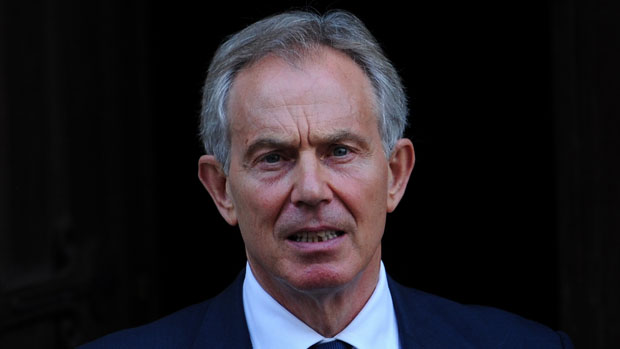Blair: we must look beyond Ukraine and work with Russia against Islamism
Former PM tells London audience the West should ignore 'differences' with Russia to combat extremism

A free daily email with the biggest news stories of the day – and the best features from TheWeek.com
You are now subscribed
Your newsletter sign-up was successful
TONY BLAIR believes that Western leaders must co-operate with other countries - "in particular, Russia and China" - regardless of "other differences" in the fight against Islamic extremism.
The former PM used a speech in London this morning to call for religious extremism to be placed at the "top of the agenda". His remarks were seen by some as a call to overlook Russia's annexation of the Ukrainian province of Crimea, but he later denied that interpretation.
"Ukraine is a separate issue where we should take a very strong position indeed," he said, during an interview with Sky News. "What I am saying in the speech today is that this rising threat of Islamism is a threat that we share in common, West and East."
The Week
Escape your echo chamber. Get the facts behind the news, plus analysis from multiple perspectives.

Sign up for The Week's Free Newsletters
From our morning news briefing to a weekly Good News Newsletter, get the best of The Week delivered directly to your inbox.
From our morning news briefing to a weekly Good News Newsletter, get the best of The Week delivered directly to your inbox.
The Guardian quotes Blair at length: "The threat of this radical Islam is not abating. It is growing. It is spreading across the world. It is destabilising communities and even nations.
"It is undermining the possibility of peaceful co-existence in an era of globalisation. And in the face of this threat we seem curiously reluctant to acknowledge it and powerless to counter it effectively".
Speaking to the BBC ahead of the speech, Blair said the UK would pay "a very heavy price" for not intervening in Syria and added that he would have pushed for the imposition of no-fly zones, if he had still been in power when the civil war there erupted three years ago.
Not everyone is impressed by his comments. The Huffington Post observes that "it is unknown what the former Labour leader would like to happen to the people of Ukraine and Crimea in the interim [while Islamism is tackled]."
A free daily email with the biggest news stories of the day – and the best features from TheWeek.com
Blair is now a Middle East peace envoy for the EU, US, UN and Russia - and his speech was an impassioned plea for the West to take sides and engage in the Middle East.
He said: "The important point for Western opinion is that this is a struggle with two sides. So when we look at the Middle East and beyond it to Pakistan or Iran and elsewhere, it isn't just a vast unfathomable mess with no end in sight and no one worthy of our support.
"It is in fact a struggle in which our own strategic interests are intimately involved; where there are indeed people we should support and who, ironically, are probably in the majority if only that majority were mobilised, organised and helped."
-
 The broken water companies failing England and Wales
The broken water companies failing England and WalesExplainer With rising bills, deteriorating river health and a lack of investment, regulators face an uphill battle to stabilise the industry
-
 A thrilling foodie city in northern Japan
A thrilling foodie city in northern JapanThe Week Recommends The food scene here is ‘unspoilt’ and ‘fun’
-
 Are AI bots conspiring against us?
Are AI bots conspiring against us?Talking Point Moltbook, the AI social network where humans are banned, may be the tip of the iceberg
-
 Epstein files topple law CEO, roil UK government
Epstein files topple law CEO, roil UK governmentSpeed Read Peter Mandelson, Britain’s former ambassador to the US, is caught up in the scandal
-
 Iran and US prepare to meet after skirmishes
Iran and US prepare to meet after skirmishesSpeed Read The incident comes amid heightened tensions in the Middle East
-
 Israel retrieves final hostage’s body from Gaza
Israel retrieves final hostage’s body from GazaSpeed Read The 24-year-old police officer was killed during the initial Hamas attack
-
 China’s Xi targets top general in growing purge
China’s Xi targets top general in growing purgeSpeed Read Zhang Youxia is being investigated over ‘grave violations’ of the law
-
 Panama and Canada are negotiating over a crucial copper mine
Panama and Canada are negotiating over a crucial copper mineIn the Spotlight Panama is set to make a final decision on the mine this summer
-
 The rise of the spymaster: a ‘tectonic shift’ in Ukraine’s politics
The rise of the spymaster: a ‘tectonic shift’ in Ukraine’s politicsIn the Spotlight President Zelenskyy’s new chief of staff, former head of military intelligence Kyrylo Budanov, is widely viewed as a potential successor
-
 Why Greenland’s natural resources are nearly impossible to mine
Why Greenland’s natural resources are nearly impossible to mineThe Explainer The country’s natural landscape makes the task extremely difficult
-
 Iran cuts internet as protests escalate
Iran cuts internet as protests escalateSpeed Reada Government buildings across the country have been set on fire